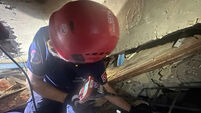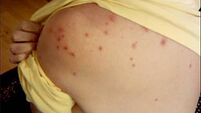'It was disgusting': 80 complaints or feedback messages about school meals

Aspects of the programme have come in for criticism with the HSE’s National clinical lead for obesity Donal O’Shea voicing concerns about the inclusion of ultra-processed foods. File picture: Dan Linehan
Mouldy ciabatta bread, ‘high sugar content’ extra treats, and “blatant menu limitation” for children living with coeliac disease are just some of the complaints made recently about school meals.
Documents released under the Freedom of Information Act detail almost 80 complaints or feedback messages about the School Meals Scheme filed with the Department of Social Protection.
The scheme, overseen by the department, provides funding to schools for children's food, with all primary schools now eligible for hot meals.
Aspects of the programme have come in for criticism. The HSE’s National clinical lead for obesity Donal O’Shea voiced concerns about the inclusion of ultra-processed foods.
The documents show that one parent wrote to the then social protection minister Heather Humphries telling how her eldest child, not a “fussy eater” usually, ordered a ciabatta.
“As she opened it, she found the bread to be visibly molded [sic]. This was not the first or second time this has happened. I have a child that won't eat the school lunch now, as a result. I asked both my kids to bring home their lunches, and I was horrified to see vegetables half cooked, dried-out pasta. It was disgusting.”
The parent also criticised the “high percentage of waste” left over from the school meals.
“I understand the food sources have gone up in price, but the standard and quality that [redacted food provider] are handing out has gone down significantly year on year."
Fianna Fáil TD for Louth Erin McGreehan, then a senator, also wrote to the minister expressing concerns about aspects of the school meals programme.
It had come to her attention that some operators provide additional items for sale that are under the hot meal scheme.
“While I do appreciate that parents can decide to purchase these, I was alarmed to hear the high sugar content in these items. Although it might not be paid for by the department, have the department considered controlling the selling of such additional treats with high sugar content?"
In response, the minister said schools are required to submit a sample menu with their application for funding as well as detailed records at the end of each school year.
Expenditure on unhealthy food items is deducted from the funding and funding allocation, she added.
“Unfortunately, controlling the sale of items of high sugar content to parents by the suppliers falls outside the remit of the school meals program. My department can only audit meals funded by the department.”
Among the complaints received by the department are several letters and emails highlighting the lack of options for children who live with coeliac disease.
The Coeliac Society of Ireland described the exclusion of coeliac children from the program as a “clear case of discrimination and neglect, as the program caters for other dietary needs based on culture, religion or preference, but not on medical necessity.”
The disease has a “significant impact on a child's development, causing various symptoms and complications".
"These include delay, delayed growth, weight loss, anemia, nausea, vomiting, abdominal pain, constipation, mouth ulcers, liver problems and more," it said.
“The only treatment for coeliac disease is a lifelong, strict gluten-free diet. There is no cure.”
One parent said the “blatant menu limitation” for those with coeliac disease means their children “feel different every single day” in school.
“I don't expect a full menu choice, but there is definite room for improvements and some easy wins available. My kids are not very fussy eaters, and they love food,” the parent wrote.
However, they “come home every day feeling very jealous of the lovely options available to the other children in their class".
“This disappointment is something they have to live with for birthday parties, etc., but the fact that it's in school, their safe, inclusive environment that they attend five days a week is heartbreaking.
“I understand that this is a first world problem current to other issues in society. However, public money is being spent, and I strongly believe it should be spent to be more inclusive of those with allergens.
"The current situation is not just about onion lunches but feelings, socially inclusive with their friends.”







